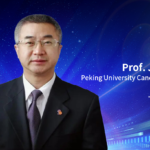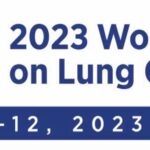Editor’s Note:
The 2023 World Conference on Lung Cancer (WCLC) was held in Singapore from September 9 to 12. The “Oncology Frontier” team delved into the frontlines, capturing international advancements, and witnessing China’s progress in the global anti-cancer arena. On the third day of the conference, the Oral Abstract Session 9 (OA09) focused on “Immunotherapy for Advanced Non-Small Cell Lung Cancer (NSCLC).” Dr. CaiCun Zhou from the Shanghai Pulmonary Hospital presented two oral reports, highlighting the latest data from ASTRUM-004 (Abstract OA09.05) and IMpower151 (Abstract OA09.06), elucidating the first-line treatment research results for squamous and non-squamous NSCLC. At the conference venue, we had the privilege of interviewing Dr. CaiCun Zhou to decode the hot topics and crucial clinical studies presented at the 2023 WCLC.

Dr. Caicun Zhou
Chief Physician, Professor, Doctoral Supervisor
Department of Medical Oncology, Shanghai Pulmonary Hospital, Tongji University School of Medicine
IASLC President-Elect
01.
Oncology Frontier: Due to the impact of the pandemic, domestic experts attended the WCLC conference in person for the first time in several years, engaging in face-to-face exchanges with international scholars. Please share your thoughts on your conference experience.
Dr. CaiCun Zhou: In the past three years, the pandemic hindered our participation in international academic activities. This year, we could finally attend the World Conference on Lung Cancer in person. At the 2023 WCLC, I met many thoracic oncology experts. My deepest impression is that many Chinese experts presented significant research, publishing results on various drug studies. This demonstrates the dedication of Chinese lung cancer experts, who have worked diligently in recent years.
My second personal experience is that everyone is continually advancing on the path of academic pursuit. In the joint discussion session of the three conference chairpersons, the MARS2 study on neoadjuvant chemotherapy combined with surgery for pleural mesothelioma (Abstract PL03.10) left a lasting impression on me. This study compared pleurectomy combined with chemotherapy versus chemotherapy alone. Despite the challenges in conducting this study and the limited number of enrolled patients, reflecting negative results, it showcased the efforts and work of thoracic oncology experts for academic progress and patient welfare.
Thirdly, the 2023 WCLC presented a wealth of new content. We also noticed that the era of Antibody-Drug Conjugates (ADC) has arrived, with more ADC drugs about to enter real-world clinical practice.
02.
Oncology Frontier: ADC has been one of the research hotspots in recent years, and the 2023 WCLC has published many important research results on ADC therapy for small cell lung cancer and non-small cell lung cancer patients. Could you talk about the research that impressed you the most and the development direction of ADC?
Dr. CaiCun Zhou: Several ADC targets have gained recognition, including HER2, TROP2, and HER3, among others. HER2-ADC T-DXd was approved by the U.S. FDA last year for treating unresectable or metastatic NSCLC with activating HER2 mutations. This year, we also saw more research results on TROP2 ADC, with some TROP2 ADCs showing promising efficacy data in lung cancer treatment. The 2023 WCLC also released several HER3 ADC research results, such as the HERTHENA-Lung01 study (Abstract OA05.03). In this study, the HER3 ADC drug Patritumab Deruxtecan was used for advanced EGFR-mutant NSCLC patients who had previously undergone EGFR-TKI and platinum-based chemotherapy. The preliminary results showed a median progression-free survival (PFS) of 5.5 months and a noticeable improvement in overall survival (OS) with a preliminary result of 11.9 months. For patients who have failed targeted therapy and other treatments, subsequent-line treatment becomes more challenging. The efficacy data of ADC provides us with new opportunities and hope.
As lung cancer experts, we now need to not only optimize chemotherapy but also excel in targeted therapy, immunotherapy, and emphasize the value of ADC. ADC research represents the next wave of drug development in lung cancer treatment.
TAG: WCLC 2023, Interview, NSCLC


